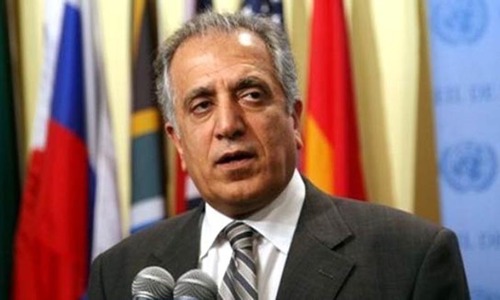The US special envoy for Afghan peace, Zalmay Khalilzad, on Thursday discussed developments in the Afghan reconciliation process with Foreign Secretary Tehmina Janjua and Chief of the Army Staff General Qamar Javed Bajwa.
Ambassador Khalilzad, who arrived in Pakistan earlier today, was accompanied by an interagency delegation representing the departments of defence, state and National Security Council. Foreign Secretary Janjua was assisted by senior officials from the Ministries of Foreign Affairs and Defence, a statement issued by the Foreign Office said.
In his meeting with the foreign secretary, the US special envoy briefed the government delegation on his recent engagements in the region and praised Pakistan's role in facilitating direct talks between the US and the Afghan Taliban — which were held last month in Abu Dhabi.

Janjua reiterated Pakistan's commitment to advance the Afghan reconciliation process so that the shared goal of peace and stability in the region may be realised, according to the FO statement.
"It was noted that taking the Afghan peace process forward remained a shared responsibility," the statement said.
The two sides shared the same views regarding the importance of intra-Afghan dialogue which would ultimately pave the way for "a future Afghan polity where Afghanistan becomes a stable and prosperous country and at peace with its neighbours", according to the handout.
Pakistan is believed to be making serious efforts to arrange a meeting between the US special envoy and Afghan Taliban leaders in Islamabad to help break the deadlock and speed up the Afghan peace process, sources earlier told Dawn.

Ambassador Khalilzad's ongoing visit marks his fifth trip to the region. The envoy will call on Foreign Minister Shah Mahmood Qureshi on Friday (tomorrow), the FO said.
According to the FO spokesperson, Khalilzad, who arrived in Islamabad two days later than expected, had taken the Pakistan side into confidence about the delay in his arrival in the country.
Meeting with the army chief
A delegation led by Khalilzad and including US commander for Afghanistan General Austin Scott Miller separately met Army Chief General Qamar Javed Bajwa at the army's General Headquarters in Rawalpindi, according to a statement issued by the Inter-Services Public Relations (ISPR).
Matters pertaining to regional security and the Afghan peace and reconciliation process were discussed between the two sides. The US delegation appreciated Pakistan's efforts towards the peace process, the military's media wing said.
Gen Bajwa reiterated the importance Pakistan accords to peace in Afghanistan and assured the US delegation that efforts to bring peace and stability in the region will continue on the part of Pakistan.
Lisa Curtis, who is deputy assistant to the US President and the senior director for South and Central Asia and the US charge d’affairs to Pakistan were also present during the meeting.
Khalilzad's four-nation trip is expected to end on January 21.
'Political settlement'
A press release from the US State Department had earlier stressed the US's desire to reach a "political settlement" to the Afghan conflict and "empower the Afghan people to chart a shared course for their nation’s future".
"The United States supports the desire of the Afghan people and the international community for a political settlement that ends the 40-year conflict and ensures Afghanistan never again serves as a platform for international terrorism," the statement added.
It further claimed that the US goal is to "promote dialogue among Afghans" and ensure that all concerned parties reach a solution that will allow "every Afghan citizen [to] enjoy equal rights and responsibilities under the rule of law".
The US special envoy is actively trying to broker a political solution to the Afghan conflict and has held multiple meetings with the leadership of Afghanistan as well as that of other countries in the region, including Pakistan.
He has also held three rounds of talks with the Afghan Taliban in order to reach a settlement that would allow the US to withdraw its army and end a 17-year-old war — America's longest.















































